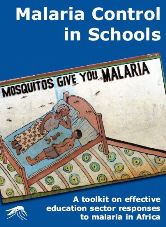Global Impact
Malaria is a parasitic disease caused by Plasmodium spp and is transmitted by mosquitoes. There are four parasite species that cause malaria in humans, each have varying degrees of risk, with Plasmodium falciparum being the most deadly. Malaria depends on climatic conditions that may affect the number and survival of mosquitoes, such as rainfall patterns, temperature and humidity. In many places, transmission is seasonal, with the peak during and just after the rainy season.
Malaria is widespread in the world's poorest countries, infecting between 300 and 500 million people a year and killing over one million people. In these high burden settings malaria can trap families and communities in a downward spiral of poverty.
Children at risk
Malaria epidemics can occur when climate and other conditions suddenly favour transmission in areas where people have little or no immunity to malaria. Partial immunity is developed over years of exposure, and does reduce the risk that malaria infection will cause severe disease. This is part of the reason most malaria deaths in Africa occur in young children, whereas in areas with less transmission and low immunity, all age groups are at risk. (WHO 2012)
Why is combatting Malaria so important?
In 2010 90% of malaria deaths occured in Africa and almost 600,000 African children died from malaria. Malaria caused an estimated 655 000 deaths (with an uncertainty range of 537 000 to 907 000); in Africa a child dies every minute from malaria (WHO 2012).
Investments in malaria control have created unprecedented momentum and yielded remarkable returns in the past years. In Africa, malaria deaths have been cut by one third within the last decade; outside of Africa, 35 out of the 53 countries, affected by malaria, have reduced cases by 50% in the same time period. In countries where access to malaria control interventions has improved most significantly, overall child mortality rates have also fallen by approximately 20%.
However, these strides are now under threat; the focus on malaria control is beginning to fade and has led to insufficient financial support, particularly across Africa where high-burden countries are facing critical funding gaps. To avoid this, further investment must be made to ensure that this funding gap is bridged and that the endemic countries have the resources and technical support they need to see their elimination of malaria.
Malaria Control in Schools:
 | The Malaria Control in Schools toolkit aims to enable education professionals to develop effective programmes on the prevention and control of malaria for school-age children within malaria endemic countries.
Practical up-to-date information and experience on the control of malaria in schools is presented with both technical and policy advice on malaria, and how countries can plan and implement school-based malaria interventions.
|
Other Malaria Resources

